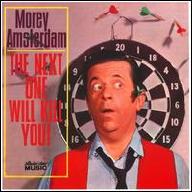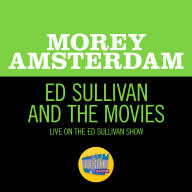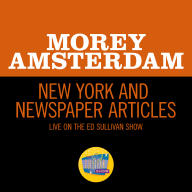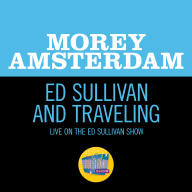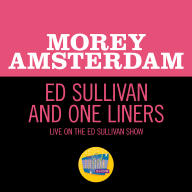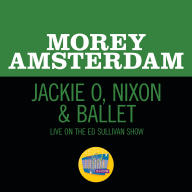He was born in Chicago on December 14, 1914, but the family soon emigrated to the West Coast, settling in San Francisco. It was there that he entered show business at the age of ten, working as a boy soprano on a local radio station. His early lessons on the cello came in handy when he joined his older brother's vaudeville act a short time later. When his brother later decided to quit show business, Morey decided to continue as a single. In between developing his rapid-fire joke machine, novelty tunes with cello nightclub act, Amsterdam found himself regularly in demand as a comedy writer. Sometimes brought in at the last minute to punch up a tired radio or television script, Morey worked at various times for Will Rogers, Milton Berle, Fanny Brice, Jack Benny, and Henny Youngman. He also frequently appeared as a guest on a number of radio and television shows in the late '40s and early '50s pre-Van Dyke period, among them #Can You Top This?, #Stop Me If You've Heard This One, #Sooner or Later, and the #Morey Amsterdam Silver Swan Show. Equally adept at both comedic and dramatic turns, his film credits included #Machine Gun Kelly, #The Horse in the Gray Flannel Suit, #Don't Worry, We'll Think of a Title, #Murder, Inc., #Muscle Beach Party, and #Wholly Moses with Richard Pryor. He would later go on to direct and produce as well. But it was his role as Buddy Sorrell on the Van Dyke show that truly brought him to national awareness. Playing the wisecracking TV-show writer Buddy -- in what was perhaps the perfect ensemble sitcom cast of all time -- some saw his role as art imitating real life. "I am Buddy," Amsterdam would tell interviewers. "Buddy is not only a comic, but an experienced writer, a fellow who knows timing and funny situations." Others would point to that impeccable comic timing, which acted as the anchor in almost every scene he worked in. One episode in particular, "Divorce," provided a hitherto unseen glimpse of Morey's dramatic talents playing the Buddy character for something other than straight laughs. When the show closed up shop in 1966, the comedian sent a thank-you letter to the producers, commenting, "I learned a great deal. When you surround yourself with happy people, it's much easier to do the show. We had fun." Amsterdam would always fondly recall it as the happiest five years of his show business career. After completing his five-year run on the show, Morey also wrote two books, -Keep Laughing and -Morey Amsterdam's Book for Drinkers or Betty Cooker's Crock Book. Still active into his eighties, his final appearance before the cameras was a 1996 guest appearance with old friend and #Van Dyke Show co-star Rose Marie on the NBC sitcom, #Caroline in the City. When he passed away in November 1996 from a heart attack, his old boss Dick Van Dyke said fondly and truthfully, "When Morey died, he took about 100,000 jokes with him." The human joke machine, indeed. ~ Cub Koda, Rovi
Morey Amsterdam
from Chicago, IL
December 14, 1914 - November 1, 1996 (age 81)
Biography
Morey Amsterdam was known as "The Human Joke Machine," a sobriquet that was no mere hyperbole. You could toss him any subject and within seconds, the database in his head produced the requisite joke needed to match the situation. Thought processes aside, it wasn't cerebral, it wasn't comedy that you could savor like a well-turned phrase or a clever idea; it was stand-up comedy straight out of the Catskills and Borscht Belt tradition of "here comes the jokes, folks!," an energetic style short on subtleties and long on rapid-fire delivery. But like Milton Berle -- who had been mining a similar approach for years -- Amsterdam could work an audience to death and get over on just sheer energy of presentation alone. Long before he became entrenched in the national consciousness with his role as Buddy Sorrell on #The Dick Van Dyke Show, Morey had already built up a solid reputation as a nightclub performer, comedian, and behind-the-scenes comedy writer. He also regularly dabbled in songwriting and exhibited a flair for constructing a top-flight novelty tune. That Amsterdam wrote Rum and Coca-Cola, a big World War II hit for the Andrews Sisters is perhaps the best trivial pursuit question you could ask about the man. And his theme song of sorts, Yuk A Puk, along with Why oh Why Did I Ever Leave Wyoming? emanated from his prolific pen as well.
Top Tracks
Albums
Videos
Close



